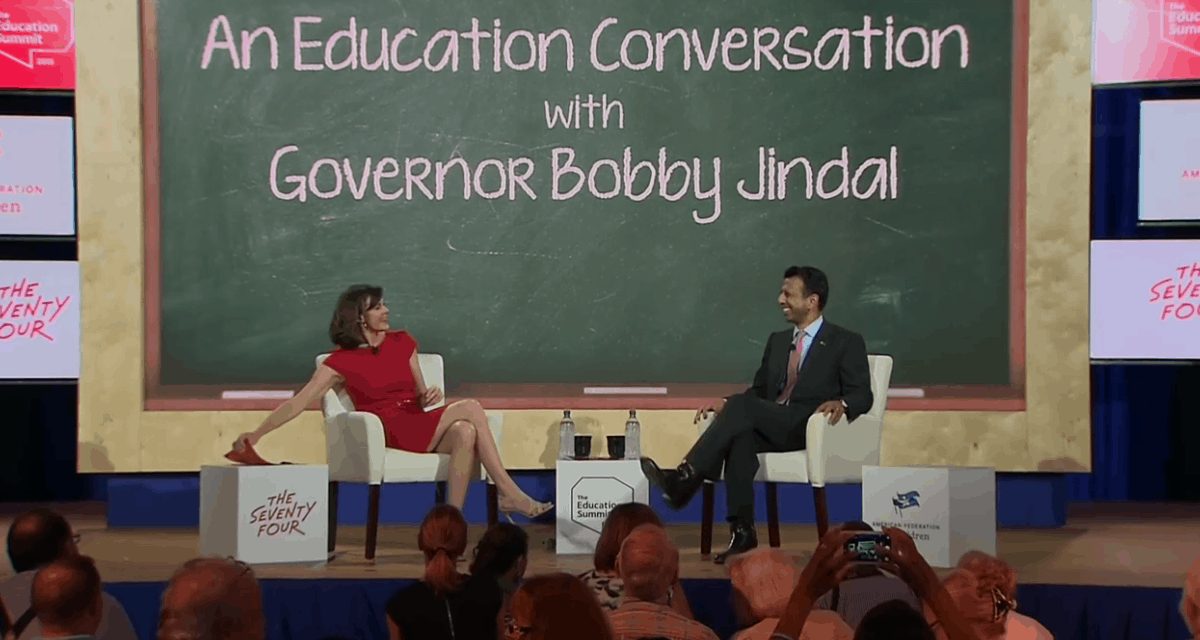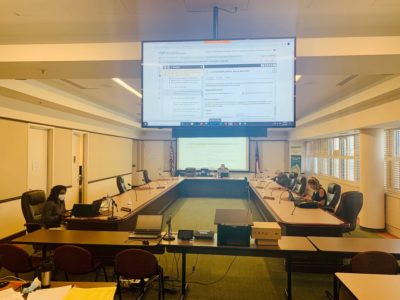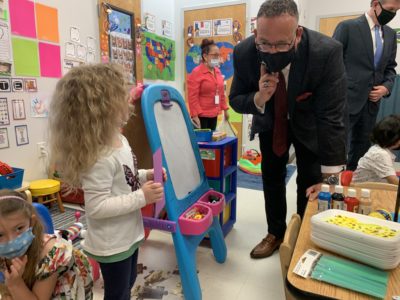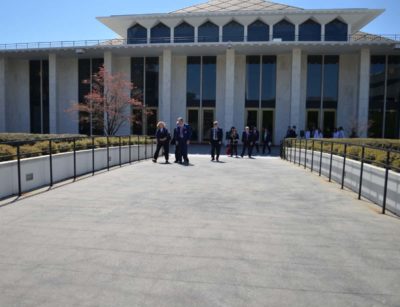
Wednesday afternoon, the 2015 New Hampshire Education Summit continued with New Jersey Governor Chris Christie, Louisiana Governor Bobby Jindal, and Wisconsin Governor Scott Walker answering a series of education questions ranging from Common Core to federal overreach.
The summit, sponsored by the American Federation for Children and hosted by The Seventy Four — a nonpartisan, nonprofit education news website — brought to New Hampshire former Florida Governor Jeb Bush, New Jersey Governor Chris Christie, Carly Fiorina, Louisiana Governor Bobby Jindal, Ohio Governor John Kasich, and Wisconsin Governor Scott Walker.
School Choice
All three candidates are proponents of school choice, and spent a portion of their talks railing against the barriers that limit vouchers and charter schools, which they say will help fix a broken education system.
Walker said that politicians in Washington, D.C., onerous regulations, and teachers unions are the main impediments to more widespread access to school choice across the country.
Wisconsin was the first state to introduce vouchers in 1990, and Walker said it’s helped spread access to high-quality education in his state, noting that — unlike in North Carolina so far — the income gap was lifted so that middle class families could benefit from the program as well.
Jindal had one of the most compelling stories to tell, having been governor of Louisiana as it weathered Hurricane Katrina. But things weren’t exactly rosy prior to the epic storm, he said.
“It’s very easy to look back and say Hurricane Katrina and Rita created all of our problems,” he said.
He noted that New Orleans Public Schools were considered one of the worst school systems in the country prior to Katrina, and more than 60 percent of students there were attending failing schools. And then Katrina hit and the education system had to change.
“They basically said we’re starting from scratch,” he said.
Now, post-Katrina, the majority of students in New Orleans attend charter schools, and the percentage of students attending failing schools is closer to 10.
“If you had to pick one thing to do, I would emphasize choice and competition,” he said. “Let the dollars follow the students.”
The questioning of Christie began with the interviewer mentioning two facts about New Jersey schools: they have some of the highest achievement scores in the country, but one of the biggest achievement gaps.
“This cannot be a right and just system with that kind of achievement gap,” Christie said.
He said uncooperative members of the education establishment are to blame for stalling reforms in New Jersey Schools. He said that when you put underperforming students in good charter schools, their achievement scores go up.
Common Core
All three of the candidates in the afternoon were once Common Core supporters who have since distanced themselves from the controversial standards.
Walker said that the standards weren’t on his radar at first, but then parents, teachers, and activists started raising questions.
“The concerns that people raised we thought were legitimate,” he said.
He emphasized that he thinks high standards are important, but they should be set at the local level.
Jindal said that the federal government mislead the states about Common Core.
“I like the concept of what we thought Common Core was going to be,” he said.
He said he was told that the standards were voluntary, there would be local control, and they would be rigorous.
“We now have math experts saying, this is no way to teach math,” he said.
He said he’s also concerned that parents aren’t able to give input on Common Core. When parents don’t like the way their children are being taught, he said their concerns are often dismissed.
However, he said parents should be able to choose Common Core if they do, in fact, like it.
“If you want to send your child to a place that teaches Common Core, I’m not saying you shouldn’t do it,” he said. “I’m saying the federal government shouldn’t force you.”
He said that parents are smart enough to adopt smart standards, and people shouldn’t think that people in Washington, D.C., know better how to teach children.
Christie said he supported Common Core until he realized it was ineffective.
“It doesn’t work. I tried four years of Common Core in New Jersey,” he said.
Gradually, he said it became clear that three constituencies in his state were against it. Teachers, parents, and students.
While common standards across the states may seem like a good idea, Christie said that America is too diverse to be represented by them.
“Let’s face it, there are cultural, regional differences in our country that we not only respect, but celebrate,” he said.
A national set of standards isn’t the right course of action, he said, and parents, teachers, and students on the ground aren’t “buying” it, so we need to stop “selling” it.
Unions
Walker led Wisconsin during a time when the state changed the collective bargaining laws to weaken the role of unions, and he touted the transformative effects on education.
He said the change helped education thrive without the level of interference he says unions bring. Now teachers can be hired or fired based on merit, rather than holding onto their jobs for years due to the protections of seniority and tenure.
“That means they can put the best and brightest in the classrooms,” he said. “I’m proud to say four years later, graduation rates are higher.”
Jindal said one big obstacle to school reform is “a lot of people who are going to battle the status quo.”
He called out unions in particular, noting that he once heard a teachers union leader say “Parents don’t have a clue when it comes to making choices for their kids.”
However, he said opponents to reform are single-minded in their protest, and for school reform to happen, the proponents must be equally single-minded.
“The folks who are for reform, we have to make this a priority,” he said.
Christie said that in New Jersey, too, teachers unions are an impediment to school reform. He said they oppose it because they know any solution will end their monopoly.
He also said that change is hard because the unions “buy the legislature.”
However, they are a force and a fact of life, so he said a leader can’t simply refuse to work with them.
The Federal Role
All three candidates believe the federal government should play a smaller role in state education.
On the reauthorization of the Elementary and Secondary School Act being hashed out in Washington, D.C., Walker didn’t have a lot of optimism.
“Even with the best of intentions…the more barriers you put in front of education…the more challenges that are out there,” he said.
It would be better if the money and resources being leveraged in D.C. went to states so they can structure education in a way they know it will work.
Jindal worried that the United States is becoming more dependent on the federal government.
“I don’t think all the wisdom is in D.C,” he said.
And he’s proven his dedication to smaller government, he said, by reducing the number of government workers in Louisiana by 35,000 during his reign.
He said that government programs often don’t work the way they’re supposed to. He gave the example of Title I funding, saying, “Right now those dollars don’t always go to the classrooms,” where the students they’re supposed to help could benefit.
He also bemoaned the micromanagement of the federal government in areas where they have no business intervening: such as school lunches. He said he doesn’t understand why the federal government should be in charge of what students are eating.
Christie said the federal government doesn’t have the expertise to fix the education system. He said states and local districts are better positioned to do something about it.
“There is no way that a bureaucrat in Washington, D.C., knows more about how to educate a kid…than do the people locally on the ground there,” he said.
Go here to read more about the candidates education platforms.
Go here to see the interviews.




